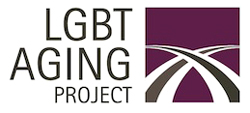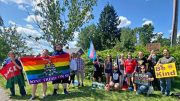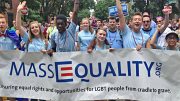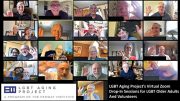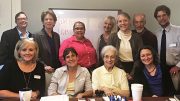Call on lawmakers to pass bill that would require elder service provider training in LGBT issues
BOSTON, Massachusetts — Today, MassEquality and the LGBT Aging Project praised the Patrick Administration for recognizing that LGBT elders have unique needs separate from the greater population and for urging local elder service agencies to specifically reach out to LGBT elders.
On Nov. 8, the Executive Office of Elder Affairs (EOEA) published a directive to elder service agencies in Massachusetts informing them that the state was adopting federal guidelines around elder populations in greatest need of targeted outreach. The federal Administration for Community Living, which works to keep elders living as independently as possible, recently concluded that lesbian, gay, bisexual, and transgender elders are in need of targeted outreach for services. As a result, EOEA is requesting that local agencies that work with older adults “identify and assess the Lesbian, Gay, Bisexual and Transgender (LGBT) population as a part of their plan development.”
“We know that many older LGBT adults came of age when explicit discrimination from families, employers, neighbors, landlords, faith communities, and government were routine experiences,” said MassEquality Deputy Director Carly Burton. “As a result, many are reluctant to come out to caregivers and they frequently go without help, even when sick, rather than turn to aging service providers for assistance.”
Multiple surveys distributed by SAGE (Services and Advocacy for GLBT Elders), the National Gay and Lesbian Task Force, and the LGBT Aging Project have shown that LGBT elders have a great need for services to help them to continue living independently as they age, but that they are also unlikely to request such services:
Up to 75% of LGBT older adults live alone; 90% do not have children and 80% age as single persons—increasing their need to rely on formal systems of care. (SAGE and Hunter College Brookdale Center, “Assistive Housing for Elderly Gays and Lesbians in New York City,” October 1999.)
Over 70% of LGBT elders are “tentative” about using agencies that serve older adults. (Robert Behney, “The Aging Network’s Response to Gay and Lesbian Issues,” Outward newsletter, the Lesbian and Gay Aging Issues Network of the American Society on Aging, Winter 1994.)
Elder service agencies that had offered or funded LGBT training for their staff were three times more likely to have received a request to assist a transgender person and twice as likely to have received a request to help an LGB older adult in the previous year.( “Ready to Serve? The Aging Network and LGB and T Older Adults,” SAGE, National Gay and Lesbian Task Force, 2010.)
Only 19% of LGBTs have tried to have any contact with their local senior center. (Robert Behney, “The Aging Network’s Response to Gay and Lesbian Issues,” Outward newsletter, the Lesbian and Gay Aging Issues Network of the American Society on Aging, Winter 1994.)
Approximately 3.8-7.6% of the total elder population is LGBT and this is expected to double by 2030 as the baby boomers, the first generation of post-Stonewall, openly LGBT older adults continues to age. (“Outing Age: Public Policy Issues Affecting Lesbian, Gay, Bisexual and Transgender Elders,” National Gay and Lesbian Task Force, 2010.)
“Despite having an excellent elder care system in Massachusetts, we frequently encounter providers who claim they don’t have any LGBT constituents,” said LGBT Aging Project Executive Director Lisa Krinsky. “There is a great need for training these providers about this invisible population and their unique experiences and needs in order to ensure that LGBT elders feel safe and comfortable.”
To help fill the gap with these needs, MassEquality and the LGBT Aging Project are advocating for passage of “The LGBT Awareness Training For Aging Services Providers Bill” that would require EOEA to develop a curriculum for delivery of accessible and appropriate services to LGBT older adults and caregivers. This curriculum would focus on the prevention and elimination of discrimination based on sexual orientation and gender identity and expression. It would also focus on improving access to services for LGBT older adults and caregivers.
MassEquality is the leading statewide grassroots advocacy organization working to ensure that everyone across Massachusetts can thrive from cradle to grave without discrimination and oppression based on sexual orientation, gender identity, or gender expression. We do this by partnering across issues, identities and communities to build a broad, inclusive and politically powerful movement that changes hearts and minds and achieves policy and electoral victories.
The LGBT Aging Project is dedicated to ensuring that lesbian, gay, bisexual and transgender older adults and caregivers have equal access to the life prolonging benefits, services and institutions that their heterosexual peers take for granted. Through LGBT cultural competency training for mainstream elder service providers, community building for LGBT older adults themselves, and civic leadership, the LGBT Aging Project ensures that LGBT older adults can age with the dignity and respect they deserve.
[From a news release]

